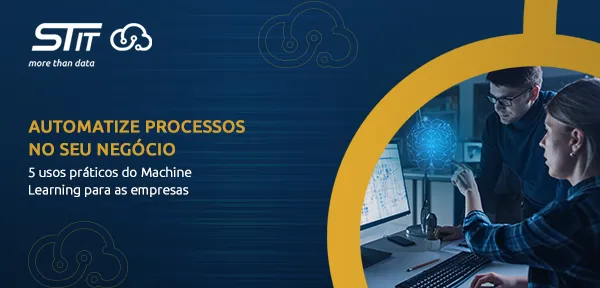5 practical uses of machine learning to automate your business processes
Technology has become fundamental to business, and Machine Learning stands out as one of the most promising technology resources for companies. Proof of this are its many benefits for automating processes.
Machine Learning is one of the main aspects of Artificial Intelligence and its algorithms allow the machine to “learn” from the data, without the need for specific programming for this. In this way, the machine is able to identify patterns and make decisions on its own.
To get the best out of this technology, we list five practical uses of Machine Learning to automate your business processes.
The importance of machine learning
Machine Learning is increasingly present and this is not by chance. The global Machine Learning (ML) market size was valued at US$ 15.44 Billion in 2021. The market is expected to grow from US$ 21.17 Billion in 2022 to US$ 209.91 Billion in 2029, exhibiting a CAGR of 38.8% during the forecast period.
However, despite all this potential, many entrepreneurs are still unaware of how this type of technology can be applied in a practical way to automate their business processes and thus gain a competitive advantage.
Machine Learning applied to companies
Machine Learning can be applied in different sectors of companies, from marketing to logistics. With the automation of tasks, Machine Learning makes it possible to optimize processes, decrease operational costs and increase productivity.
1. Marketing
In marketing, for example, Machine Learning can be used to analyze customer data, such as purchase history, preferences and interests. With this information, marketing teams can create more assertive and targeted campaigns, increasing the chances of conversion.
2. Logistics
In logistics, Machine Learning can be used to manage inventories, forecast demands and optimize routes. In this way, companies can minimize problems of lack or excess of products, in addition to reducing transportation costs.3. Sales
In the sales area, Machine Learning can be used to identify business opportunities, in addition to automating follow-ups and repetitive tasks. With this, it is possible to increase the productivity of sales teams and maximize results.
4. Customer Service
Machine Learning is also used in the customer service area to automate tasks such as sending emails and automated messages. In addition, technology is employed to analyze customer data and identify dissatisfaction trends, enabling companies to take preventive measures to avoid losses.
5. Human Resources
In the human resources area, Machine Learning can be applied to automate tasks such as analyzing resumes and interviews. In addition, its applicability includes identifying the profile of candidates, facilitating the selection of people with greater potential to occupy certain vacancies.
Machine Learning can also be used in the financial area to automate tasks such as cost control and investment analysis. With this, companies can have greater control over their financial resources, in addition to gaining insights to make more strategic decisions.
As we can see, Machine Learning is applied in different ways in the automation of companies, helping in decision-making and process optimization. Therefore, investing in Machine Learning technologies proves to be a great way to ensure a competitive advantage for your business. How to implement Machine Learning in your business?
Now that you know how Machine Learning can be applied to automate your business processes, it's time to learn how to implement the technology. Here are some tips to help you through this process:
● Define your company's goals
The first step in implementing Machine Learning is defining the goals you want to achieve with the technology. This will help you choose the best tool and machine learning model best suited for your business.
● Choose the right tool
There are several Machine Learning tools available on the market, one example is Amazon Sagemaker. Therefore, choose the tool that best suits your company's needs.
● Identify available data
To use Machine Learning, you need data to train the models. Identify what data is available in your company and how it can be used.
● Train the models
After defining the objectives and choosing the right tool, it's time to train the models. For this, use a data set to train the model and another set to test its performance.
● Implement Machine Learning in your business
Finally, it's time to implement Machine Learning in your business. Integrate the technology with other existing solutions in your company. You also need to monitor the performance of the models to ensure they are always up to date.
Machines can help businesses automate tasks and processes, saving time and money.
Machine Learning can be used to improve business operations by predicting outcomes and making better decisions based on data. By understanding the fundamentals of machine learning, your business can begin to reap the benefits of this powerful technology.
Are you ready to start automating your business processes?
ST IT Cloud, with a specialized and certified team, stands out in Machine Learning solutions, prioritizing data structuring, creating flexible analysis mechanisms and algorithm adjustments. Contact, today, and learn how to implement Machine Learning in your company to optimize processes and reduce costs.







